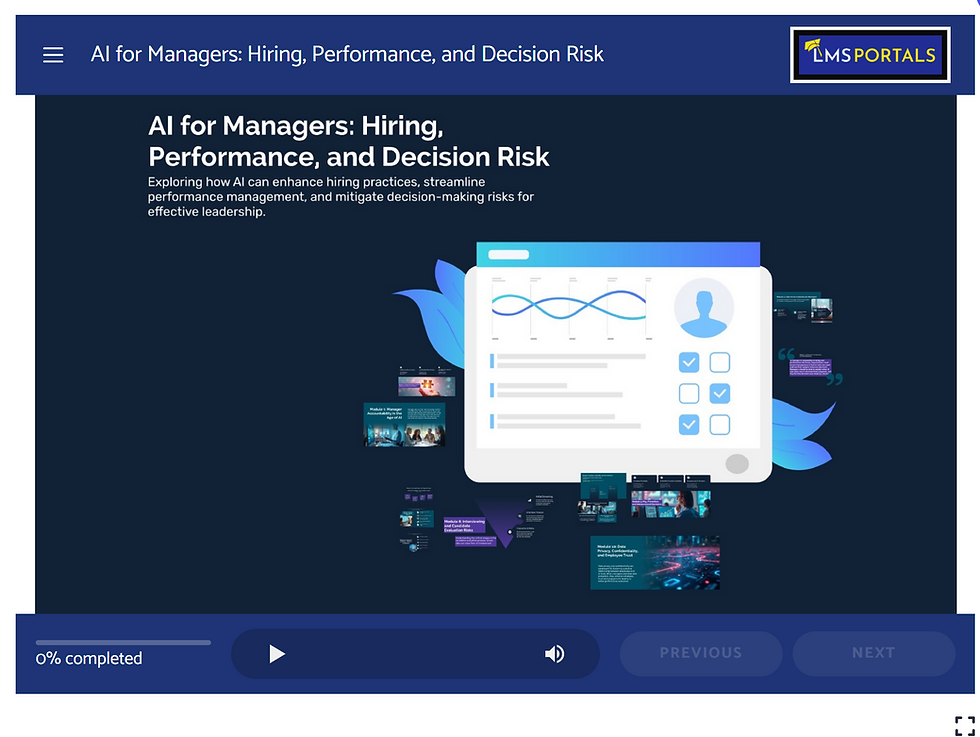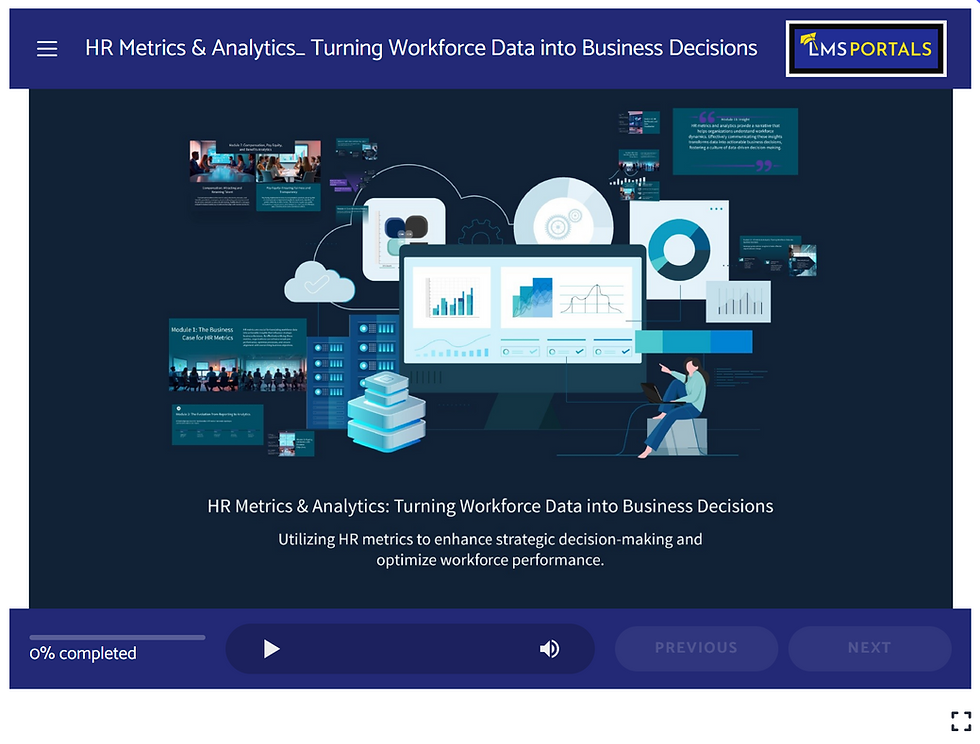Eight HR Technology Trends to Watch in the Next year
- LMSPortals

- Mar 31, 2023
- 4 min read

Technology has become increasingly important to HR departments in recent years. This importance is largely driven by the increase in remote and hybrid employees and growing demands around HR departments regarding data management and compliance,
Here are some of the key reasons why the HR reliance on technology has grown.:
Streamlining HR Processes
Technology can automate many HR processes, such as recruiting, onboarding, benefits enrollment, and performance management. This can save HR departments time and reduce errors, freeing up HR staff to focus on higher-level tasks.
Improved Data Management
HR technology allows for the collection, storage, and analysis of employee data. This data can provide insights into workforce trends and help HR departments make data-driven decisions.
Enhanced Employee Experience
HR technology can improve the employee experience by providing better communication channels, access to training and development resources, and self-service tools. This can increase employee satisfaction and engagement.
Remote Workforce Management
The rise of remote work has made HR technology even more important. Cloud-based HR systems and collaboration tools make it possible for HR departments to manage a remote workforce from anywhere, while maintaining data security.
Compliance
HR technology can help ensure that companies are in compliance with labor laws, regulations, and industry standards. For example, software can automate the tracking of employee hours and ensure that employees are being paid correctly.
Analytics and Reporting
HR technology can provide data-driven insights that help HR departments make more informed decisions. For example, analytics tools can help identify trends in employee turnover or identify areas where additional training is needed.
Technology has become an essential tool for HR departments looking to streamline processes, improve the employee experience, and make data-driven decisions.
Eight of the Top HR Technology Trends to Watch
Here are eight of the top trends to watch in HR technology in the next year:
Artificial Intelligence (AI) and Machine Learning (ML) in HR: AI and ML are becoming increasingly important in HR technology. These technologies can automate various HR processes, such as recruiting, employee engagement, and performance management. For example, AI-powered chatbots can answer employees' questions and provide support around the clock.
Focus on Employee Experience (EX): HR technology is shifting its focus to the employee experience. Companies are using technology to improve the employee experience by creating personalized learning and development opportunities, improving benefits packages, and providing better communication channels.
Virtual and Augmented Reality: Virtual and augmented reality technologies are being used to enhance training and development programs, particularly for industries like manufacturing and healthcare. VR and AR can create immersive learning experiences that simulate real-world scenarios.
Analytics and Big Data: HR technology is increasingly relying on analytics and big data to improve decision-making processes. These technologies can help companies identify trends and patterns in employee behavior, as well as track employee performance and engagement.
Remote Workforce Management: The pandemic has accelerated the trend towards remote work, and HR technology is adapting accordingly. Companies are using technology to manage their remote workforce, from virtual collaboration tools to employee monitoring software.
Diversity, Equity, and Inclusion (DEI): DEI is a top priority for many companies, and HR technology is being used to support DEI initiatives. For example, software can help companies track diversity metrics, identify areas where they need to improve, and provide unconscious bias training.
Mobile-First Approach: HR technology is becoming increasingly mobile-friendly, as more employees work remotely or use mobile devices to access company resources. Companies are creating mobile apps that allow employees to access HR services and tools from anywhere, at any time.
eLearning: The increase in remote and hybrid workforces combined with the availability of powerful new SaaS-based technologies has led to a shift away from in-person training in favor of online learning (eLearning).
The Adoption of eLearning by HR Departments
HR departments have increasingly adopted eLearning as a way to provide training and development opportunities to employees. Here are some reasons why eLearning has become popular:
Cost-effective
eLearning can be a cost-effective solution for training employees, especially when compared to in-person training sessions or sending employees to conferences.
Flexible
eLearning allows employees to learn at their own pace and on their own schedule, making it a more convenient option for busy employees. Additionally, it can be accessed from anywhere, making it ideal for remote workers or those in geographically dispersed locations.
Consistent
With eLearning, all employees receive the same training material, ensuring consistency in the learning experience. This can be especially important for compliance training or other training that requires employees to meet certain standards.
Scalable
eLearning can be scaled to meet the needs of any size organization, from small businesses to large corporations. It can also be easily updated or modified as needed.
Tracking and Reporting
eLearning systems typically include tracking and reporting features that allow HR departments to monitor employee progress and completion rates. This can be useful for compliance or regulatory purposes.
Engaging
eLearning can be designed to be interactive and engaging, using a variety of multimedia elements such as videos, animations, and quizzes. This can help employees retain information more effectively and make the learning experience more enjoyable.
About LMS Portals
At LMS Portals, we provide our clients and partners with a SaaS-based, multi-tenant learning management system that allows you to launch a dedicated training environment (a portal) for each of your unique audiences.
The system includes an embedded SCORM-compliant course authoring tool that enables most anyone to build engaging courses quickly and easily.
We also offer a complete library of ready-made courses, covering most every aspect of corporate training and employee development.
If you choose to, you can create Learning Paths to deliver courses in a logical progression and add structure to your training program. The system also supports Virtual Instructor-Led Training (VILT) and provides tools for online coaching and social learning.
Together, these features make the LMS Portals platform the ideal solution for your HR department and organization.
Contact us today to get started or visit our Partner Program pages



Comments